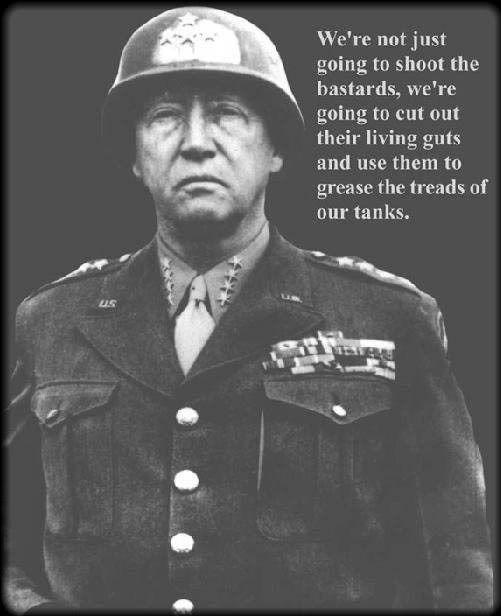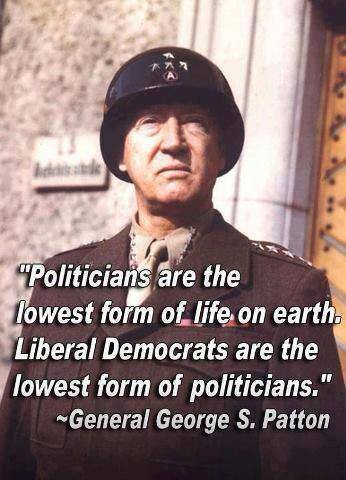
"Bad Black People." Why Bill O'Reilly Is Wrong Even When He's Right"

"Bad Black People." Why Bill O'Reilly Is Wrong Even When He's Right"
It’s a fortunate thing that Bill O’Reilly’s latest book, “Killing Patton,” was written by him and not someone else. If not, O’Reilly would have taken the poor person apart, criticizing the book for its chaotic structure, its considerable padding and its repellent admiration of a war-loving martinet who fought the Nazis and really never understood why. George S. Patton stood almost shoulder to shoulder with them in his anti-Semitism — not that O’Reilly seems to have noticed or, for that matter, mentioned it in his book.
Alan: American conservatives are exceptionally skilled at "hearing what they want to hear" while categorically denying the rest.
It is, of course, permissible to admire Patton for his generalship and astonishing bravery. It is even possible to give him a pass for some of the foolish things he said that were repeatedly getting him into trouble and finally caused Gen. Dwight D. Eisenhower to effectively sack him. Even Patton’s likening some Nazis to Republican or Democratic apparatchiks, while tasteless and heroically impolitic, had an explicable context: Plenty of people became Nazis for career, rather than ideological, reasons.
Alan: Because most of us seek "professional advancement" - typically in service to someone else's "alien" agenda - we overlook "career climbing" as a fundamental propellant of evil.


Patton’s anti-Semitism is a different matter. As far as I know, he never made his views public, but he was repulsively candid in letters home to his wife, Beatrice, and in diary entries. What’s more, he acted on those views. It was Patton’s job after the defeat of Germany to run the displaced-persons (DP) camps in southern Germany, where he was commanding officer. In the view of some, including an outraged President Harry S. Truman, he treated these Holocaust survivors little better than the Nazis did.
In a letter to Eisenhower, Truman quoted from a report on conditions in the DP camps. “As matters now stand, we appear to be treating the Jews as the Nazis treated them except that we do not exterminate them. They are in concentration camps in large numbers under our military guard instead of SS troops. One is led to wonder whether the German people, seeing this, are not supposing that we are following or at least condoning Nazi policy.”
The “military guard” that Truman mentioned was Patton’s idea. He had his reasons, Patton wrote in his diary: “If they [the Jewish DPs] were not kept under guard they would not stay in the camps, would spread over the country like locusts, and would eventually have to be rounded up after quite a few of them had been shot and quite a few Germans murdered and pillaged.” At least twice in his diary, Patton referred to the Jewish DPs as “animals.”
The report to Truman was written by Earl G. Harrison, the dean of the University of Pennsylvania’s law school who had inspected the camps. Here is what Patton thought about Harrison: “Harrison and his ilk believe that the Displaced Person is a human being, which he is not, and this applies particularly to Jews who are lower than animals.”
These excerpts from Patton’s letters and diaries can be found in “The Patton Papers,” a collection edited by Martin Blumenson, a military historian. Remarkably, O’Reilly and his co-author, Martin Dugard, cite the Blumenson volume in their bibliography but make no mention of the passages I’ve quoted. It’s not as if they don’t exhibit appropriate horror at Nazi atrocities or, for that matter, cite the two instances where Patton slapped hospitalized GIs claiming shell shock. But they are silent about Patton’s anti-Semitism. As Truman’s letter suggests, this was not a personal and irrelevant belief that had no practical application. It was a bigotry that warped Patton’s judgment and affected his treatment of some of history’s most unfortunate people. Some of his “animals” had just survived Auschwitz.
Patton didn’t care. He had witnessed the liberation of the concentration camp at Ohrdruf, a hideous place of unimaginable cruelty, and while what he saw led him, as O’Reilly writes, “to vomit at the side of the building,” it seemed to make no lasting impression. When he later took command of the DP camps, he not only made the survivors feel they were once again imprisoned but also put one-time Nazi sympathizers in with the Jews, adding an element of sheer terror. Even the effort to try leading Nazis for war crimes offended Patton: “It is not cricket and is Semitic.”
How O’Reilly could have written 335 pages on Patton and not have mentioned his repellent anti-Semitism and its impact on the DPs is beyond me. It suggests — no, not anti-Semitism — a compulsion to make the facts conform to some predetermined conviction. The result is not history but clunky hagiography, a book that tells you more about O’Reilly than it does about Patton.

Hagiography is unusually attractive to conservatives because their hard (and often cold) hearts can only be warmed by unbending moralistic principles.
Read more from Richard Cohen’s archive.
No comments:
Post a Comment